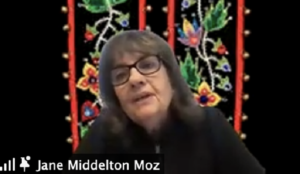Looking after ourselves so that we can help others

By Marci Becking
ANISHINABEK NATION TERRITORY – Internationally-known speaker and author, Jane Middleton-Moz, spoke to some 200 participants on Jan. 19 at the Anishinabek Nation 6th Annual Health Conference about the emotional stages and secondary effects of grief and trauma-earned resiliency and worker wellness during the coronavirus disease 2019 (COVID-19) pandemic.
“Many of us have earned tremendous resiliency during this time,” says Middleton-Moz. “And have gone through the stages from acceptance to growth during this worldwide pandemic. I never would have thought last year at this time that I would be doing a virtual keynote. I promise you I would never have done that. I have learned technology during this time. Many of us have changed and grown in terms of our own resiliency.”
Middleton-Moz says that we need to understand, with compassion, those who are still stuck in the survival stage and how we can help them.
“The pandemic is real and it induces stress in many ways. To know that many of the emotions we have been through are normal because of what we are experiencing. COVID-19 has been classified as a worldwide trauma,” she says. “We have in the past survived through social gatherings, through strength in numbers, through connections with community. This connection is difficult through the pandemic.”
She says that pandemic fatigue comes from wrestling with intense emotions day after day.
“The fatigue can stem from a number of emotions that you’ve experienced during the pandemic: fear, anxiety, loneliness, hopelessness. Signs of pandemic fatigue are: helplessness, sadness, continual worry, frustration, irritability. After months of dealing with the fallout from COVID-19, many people experience pandemic fatigue.”
She took the participants back to nine months ago and the feelings that they felt: helplessness, out of control.
“Many of us we stuck to the television and we were addicted to news and media. We had denial that it was happening. Difficulty with routine and with what we normally do every day. Difficulty with sleeping and eating. Many felt loss of motivation and direction. We began really being fearful, keeping our families safe and ourselves safe. And fear was normal during this stage. Recognizing that COVID-19 triggers times of helplessness from the past.”
She says some practices that can decrease and stress are ones like limiting your exposure to news and movies and disasters about pandemics.
“Shut that down. What’s happening is they are just getting more trauma that is coming in. Instead listen or watch movies that increase joy, compassion and positive actions. Helping people to know that when you being to overreact or shut down – slow down. Take a break. Go inside yourself and identify whether it’s regulated emotions or reactions are coming from the past or the present. One the things that I talk to people about is having a quiet space in their house – somewhere where they can go and take a break. Begin to do box breathing – inhaling through your nose to the count of four, holding it for the count of two and exhaling for the count of six through your mouth. This is one of the things that shuts down that overreaction. Taking in good positive facts and positive experiences – allow yourself to take in the positives.”
She stresses that not grieving properly affects our bodies.
“When we hold it in, we get very sick. The reason we don’t grieve is lack of social support, history of unresolved trauma, difficulty naming and expressing need. Because of past trauma we’ve lost our voice and our ability to grieve in a healthy way. There’s a life crisis prior to the loss, feeling guilt because we have feelings, grief bound in secrets and shame – we’ve learned to not speak the truth, not to have a voice so often times it’s difficult to grieve and difficulty with addictions. Pain is something that we will all experience in our life. It’s part of life, it’s part who we are. Suffering is something that we add because we don’t deal with pain.”
Middleton-Moz points out that when there is a crisis, we still have community.
“That showed up so strongly during COVID because First Nations were the first to respond in an effective way to the pandemic. Youth started planting gardens for Elders, Elders began teaching language classes virtually, virtual joke contests, people picked medicine and shared it between nations, Elders virtual storytelling, virtual potlatches and ceremonies. As one Elder said, if it will help our children and grandchildren, we need to do what we’ve always been told what is wrong – which is to record our ceremonies and songs on technology.”
Sometimes in workplaces, people are working with so much fear but they are not able to talk about it because no one gives them the opportunity. Worker wellness is so important.
“We cannot be surrounded by pain, grief, trauma and manipulation and not be affected. It’s impossible. It’s extremely important for us to be aware as workers, that we are also affected and we need to take care of ourselves. Essential workers are developing compassion fatigue, one is vicarious trauma and one is chronic stress injury,” she explains. “All of these things can be prevented by workplaces doing debriefing. When I’m in a community with a team, we debrief every single day. For people that are exposed to traumatic material, and exposed to traumatic situations, they need to have debriefing every day. People where there is a little less exposure, still need to debrief every week.”
Middleton-Moz says that when workers go home, not to watch shows that have a trauma theme – instead she says watch something like a comedy.


